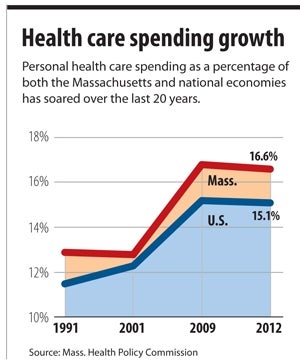Any business that wants to last for the long run — and really, how many don’t? — must maintain an iron grip on costs. That’s why a culture of creativity and innovation, one in which “faster, better, cheaper” is a mantra, is really a necessity for many organizations.
The health care industry is a dominant sector in the economic output for Central Massachusetts, and a combination of market forces, plus federal and state reform efforts, are forcing those changes to come at an accelerated pace. Even those who don’t like one of the “solutions” — the federal Affordable Care Act (or Obamacare) — admit that costs are out of control and must be reined in.
The ship of health care reform set sail here many years ago. The seas are getting choppier, and there is no turning back to shore.
A report released this month by the Patrick administration’s Health Policy Commission underscored the issue of costs in the system. The commission, which is charged with overseeing implementation of the commonwealth’s 2012 health care cost-containment law, cited between $14.7 billion and $26.9 billion in expenditures that year that it considered wasteful, or about 21 to 39 percent of health care spending in the commonwealth. It cited as specific examples $700 million in preventable readmissions to hospitals and $550 in unnecessary emergency room visits.
Nationally, the growth in health care costs has been a contagion that has yet to show signs of being controlled. From 2000 to 2010, annual per-capita health care spending soared more than 72 percent, according to the Kaiser Family Foundation. Meanwhile, the Consumer Price Index, the country’s chief inflation gauge, rose just 26.6 percent.
In Central Massachusetts, the cost-cutting pressures have hit the region’s largest health-care provider hard. Last week, UMass Memorial Health Care announced the elimination or reduction in hours of 99 positions within its medical center division, only a month after it let go 40 administrative employees, all part of an ongoing restructuring it expects to continue. For its last fiscal year, which ended Sept. 30, UMass Memorial reported operating losses of $55 million and has since cut or reduced more than 300 jobs. It seems inevitable that further reductions from restructuring are inevitable as both large and small players adjust to the evolving, new reality.
One part of the evolution that has begun has been the movement, albeit slowly at best, toward a greater transparency in the cost of treatments. The more patients health care plans leave them holding a greater part of the bill, the more information they will demand on where their dollars are spent, and why certain procedures wrack up such inconsistent costs among different doctors and institutions. This would inevitably transfer more of the cost-control power to consumers, allowing them to be more judicious about how they spend their money. The Massachusetts Medical Society, an advocacy group for Bay State doctors and patients, recommended recently in a blog post that physicians help their patients better understand those costs.
In the long run, major changes in how health care is delivered, with a greater focus on patient outcomes, less reliance on billing for procedures, and more educated consumers will lead to a more intelligent and responsive system. But getting there will involve a lot more change, and a lot more pain.

